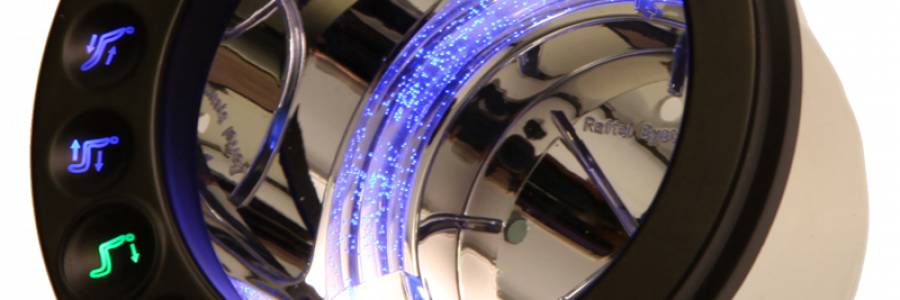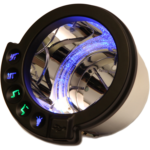A federal jury on Friday awarded more than $100 million in damages to a Germantown company that accused a Chinese furniture maker of stealing its intellectual property — the design of a multi-functional lighted cupholder.
The jury found Man Wah Holdings LTD. had infringed on Raffel Systems LLC’s patent and intentionally misappropriated its “trade dress” for the cupholder, and had even put stickers with Raffel’s patent number on the faked components.
The jury awarded about $9.3 million in actual damages for the false marking, patent and trade dress infringements. It added added $97.5 million in punitive damages for the malicious appropriation of Raffel’s trade dress, the overall look and feel of the cupholder.
The 12-person jury returned the verdicts Friday afternoon, after about six hours of deliberations at the end of a two-week trial. Officials from neither Raffel or Man Wah had any immediate comment on the verdicts.
About two dozen employees from Raffel Systems LLC in Germantown — most of its staff — packed into a small courtroom gallery at Milwaukee’s Federal Courthouse Thursday, all wearing company shirts.
They came to hear closing arguments in Raffel’s case against Man Wah Holdings LTD, a giant Chinese furniture manufacturer Raffel accused of unlawfully copying its lighted cupholder controllers used in theater-style seats made by Man Wah and several other companies.
John Scheller, a lawyer with Michael Best & Friedrich in Madison, called Man Wah’s strategy, “deliberate, planned and destructive copying,” of Raffel’s intellectual property.
“No doubt, they wanted to get rid of us. Most small companies wouldn’t stand up to Man Wah, but they underestimated the strength of Raffel’s people.”
Man Wah denied it infringed any patent or trade dress associated with Raffel’s cupholders, and painted the Wisconsin company as merely trying to leverage a short-term error into a giant payoff from a big foreign firm.https://cm.jsonline.com/overlay/061722_JuneFlashSale_inline_desktop_anon
“This is their pot of gold,” said Michael Lindinger of Washington, D.C. “They’re seeking damages from Man Wah’s profits selling furniture.”
Lindinger noted some Man Wah officials were also in attendance, all the way from China, “because this is important to them too.”
Simple idea, big business
According to its website, Mark Raffel owned a furniture store in Milwaukee in the 1980s when he began working on ways to embed motors and heaters to increase comfort. Now, the company does a global business providing controls and features for furniture, RVs, theaters and more.
The lawsuit says employee Ken Seidl got the idea for a lighted cupholder at the 2005 furniture show in North Carolina. It evolved to include controls for reclining, foot rests, head rests, massagers and other functions on theater-style seating and other so-called motion furniture. Raffel secured several patents.
It quickly became a popular component for dozens of manufacturers. Man Wah was a huge account, but Raffel insisted a change to the Chinese firm’s typical supplier agreement: it could not copy the cupholder.
Raffel employs about 30 people in engineering, design and administration at its Germantown headquarters, but makes most products at a Chinese subsidiary.
In late 2017, Man Wah did contract with another Chinese firm to make the same units, for less than Raffel was charging. Not only were the cupholders “identical,” in design and appearance (though not in reliability), the fakes even had stickers on them with Raffel’s patent number.
By mid 2018, the fakes were failing, Raffel discovered the issue, and sued.
Man Wah made changes to the holders it was having made, to make it clear they were not Raffel knockoffs. According to trial testimony, about 60,000 of the fakes were used in various Man Wah seating units sold under several brand names during 2018.
Raffel’s lawyer said there are still some 14,000 of the fakes in circulation, meaning Raffel faces the possibility of brand damage for years to come.
Fakes hurt Raffel’s reputation
During closing argument, Scheller said Man Wah clearly knew of Raffel’s patents before it ordered the cheaper, counterfeit cupholders. Man Wah also kept buying some cupholders from Raffel, though in diminishing numbers. Scheller said that was a cover up, meant to keep Raffel thinking its own products were in all the furniture Man Wah kept selling.
The knockoffs quickly proved problematic. Major US retailers who purchased from Man Wah were reporting numerous failures, and thought Raffel’s products were defective, because Man Wah blamed Raffel.
“Our reputation is forever tarnished,” Scheller told the jury.
The nearly two-week trial before U.S. Magistrate Judge Nancy Joseph included recorded and live testimony, some from China via Zoom, and battling experts trying to break down the arcane, technical aspects of patent and trademark law for jurors.
Raffel sought in excess of $10 million and in damages for patent infringement, trade dress infringement, misappropriation and false marking. Scheller suggested the jury could award even more in punitive damages.
“How do you deter someone like Man Wah?” Scheller asked, suggesting only a very large award would get the attention of a very large company. He did not specify a figure.
For Man Wah, Lindinger argued that Raffel never supported its claims of dominance in the seating control market, tied any specific research and development expenses specifically cupholder, or offered evidence as to the value of the company’s good will, which it now claims has been damaged.
Lindinger said Raffel’s total revenue from cupholder sales from 2016 through 2018 was $24.4 million, and yet was seeking anywhere from half to all that much in damages from Man Wah.
Lindinger also pressed the defense that the cupholder didn’t really have a trade dress to protect because it was primarily functional, and that its appearance and design was a result of the functionality. “Trade dress” refers to a kind of protection for products that wouldn’t qualify under patent or trademark law..
Man Wah argued no consumers were ever confused by the fake cupholders, because no one buys the furniture just because it has Raffel components. No one would know Raffel made the holders unless they disassembled the sofas, he said.
Scheller argued he didn’t have to prove the potential for confusion, because there was so much actual confusion — among manufacturers, retailer, and consumers, and even Man Wah itself. He noted that after the fakes started failing, Man Wah workers sent out more fakes as replacements when they meant to send Raffel cupholders.
During pretrial litigation, Joseph had narrowed the claims and counterclaims of the case and found that Man Wah had infringed on one aspect of one Raffel patent. Lindinger argued that patent was invalid, because the claimed novel invention aspects were just obvious to anyone in that industry.
Lindinger noted though Raffel officials testified the cupholder is the company’s premier and seminal product, it wasn’t prominently featured in its catalogs, or mentioned during occasional stories about Raffel in a furniture industry magazine.






